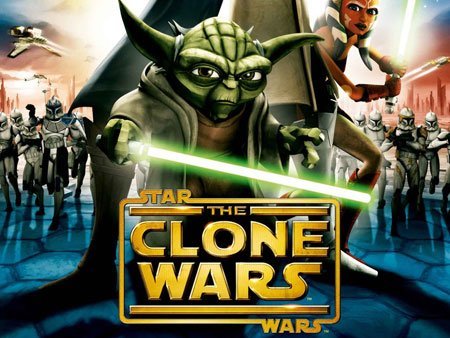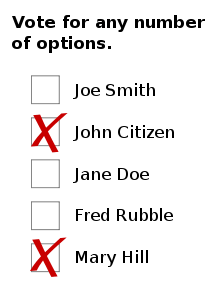
Plurality has a clone nomination split-vote problem when there are several identical candidates
In the 2012 Presidential election, it entirely within the realm of possibility that we might have had an instance of strategic clone nomination. Plurality has a split-vote problem when there are several identical candidates. It would be possible to exploit that vulnerability by nominating one or more candidates who are clones of a rival candidate. When you listen to the Internet debates among the media-shunned candidates (the ones who aren’t Democrat or Republican), you notice that one of them expresses policy positions that are (as nearly as I could tell) identical to those of Jill Stein and the Green Party. I’m referring to Rocky Anderson, of the Justice Party.
According to their website, the Justice Party USA formed about a year ago, centered on a presidential candidacy for Rocky Anderson. Many list the Justice Party among the smaller third parties, and the GPUS among the larger ones. The party website says that the Justice Party is the fifth largest third party on the ballot in the 2012 presidential election (which includes all parties other than the Democrat and Republican parties).
Listening to the debates, I didn’t notice anything said by Anderson that wasn’t also being said by Stein (and said by the GPUS before the formation of the Justice Party). So then, if the Justice Party wants the same things as the GPUS does, why was it necessary to start a new party? And why do the Justice Party and Rocky Anderson want to ask people to give their vote to a much smaller party, with vastly less ballot-status, when the much larger GPUS is offering exactly the same proposals?
Only one reason suggests itself: Strategic clone nomination—for the purpose of splitting the Jill Stein vote.
Approval, Score, ICT, and Symmetrical ICT don’t have a clone problem. There must be several definitions of the Clone-Independence Criterion, because some say that Approval passes, and some say it fails.
I won’t use the Clone-Independence Criterion, because it doesn’t have a single definition. But we can speak of the matter of whether a method has a clone problem. Here’s why I say that Approval doesn’t have a clone problem: For one thing, if you’ve approved A1, and a clone, A2 is added, there’s nothing stopping you from approving both. Someone said that he doesn’t like that typical Approval strategy need. But let’s take a closer look at it
Possibility of a strategic clone nomination
Here’s what it would take for there to, at first, seem to be a problem: You like A1 best. Though A2 is a clone of A1 (by the usual clone definition), you like A2 a lot less than A1. That’s possible even if A2 is a clone of A1. You don’t want to approve A2. Half of the original A1-preferrers agree with you on that. The other half like A2 much better than A1. In fact, they like A2 so much better than A1 that, when A2 is introduced, they’re tempted to approve only A2, in hopes of the big improvement that they perceive to thereby be possible.
For one thing, though that’s possible if A1 and A2 are clones, how likely is it really that those two A-factions, with opposite strong preferences between A1 and A2, when A1 and A2 are clones?
Additionally, it’s only a problem when you look at it from the point of view of the A1-preferrers. But their problem depends on the A2-preferrers’ problem, and on what the A2-preferrers do, so let’s look at the A2-preferrers’ problem instead.
For them, the addition of A2 is purely a positive change. It offers them a chance to try for something much better. They can do that if they want to, though it’s a gamble, because they could split the A-faction vote in half, and cause the winner to be neither A1 nor A2. But they don’t have to take that gamble. They don’t have to accept that problem. If they don’t accept the problem, by taking the gamble, then there isn’t a problem. If they can choose to not have that problem, then how can it be called a problem?

The addition of A2 is a pure improvement for the voters who prefer A2 to A1. They clearly and obviously improve their expectation if they approve both, and they risk nothing thereby. A pure improvement can’t be called a problem. The above applies just as well to the clone problem in ICT and Symmetrical ICT.
Here are some things that I’ve mentioned previously:
1.
Even if the clone problem described above were a strategy-need worth mentioning, it’s still only the ordinary, typical Approval strategy (that’s likewise true in ICT and Symmetrical ICT). And wouldn’t it be nice if other methods didn’t have strategy needs or problems worse than those of Approval.
The chicken dilemma is a worse strategy situation than the ordinary Approval strategy situation. The possibility of a chicken dilemma is measured by the CD criterion. CD is failed by Condorcet methods other than ICT and Symmetrical ICT. So, trading ICT’s and Symmetrical ICT’s CD for Clone-Independence would be a poor trade.
Additionally, unimproved Condorcet fails FBC too, and so that must be counted among what would be lost in that trade. That’s true in the comparison between Approval and (say) Beatpath, and likewise in the comparison between ICT or Symmetrical ICT and Beatpath.
2.
As I’ve said, all of our elections are u/a elections. The strategy of Approval, Score, ICT, and Symmetrical ICT are very simple in u/a elections.
Even the most pessimistic interpretation of the problem described above, with the addition of A2, is irrelevant and non-problematic in a u/a election, where Approval’s optimal strategy is to approve all of the acceptables and none of the acceptables—and where ICT’s strategy calls for top-ranking all of the acceptables and none of the acceptables. Addition of clones doesn’t cause any strategy dilemma in Approval, ICT, or Symmetrical ICT, in a u/a election.
Michael Ossipoff says
I want to add that, I have retracted and apologized for the suggestion that the Justice Party was a strategic clone of GPUS (one of the two U.S. Green parties).
At one time I didn’t understand why the Justice Party (JP) would run with a platform so similar to that of GPUS But I can now say that there are lots of reasons why JP is more deserving of our votes than GPUS is, and why JP is more potentional to be winnable.
I
But that’s a long topic, maybe the subject for another article.
But let me now take this opportunity to apologize again to JP for my suggestion that they might be a strategic clone.
JP is my favorite nonsocialist party. If we had rank-balloting, I’d always rank JP over GPUS.
Michael Ossipoff